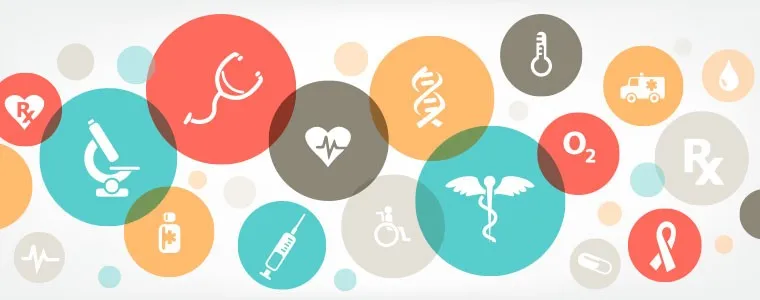

Hidden Benefits of Health Insurance that You may be Missing
Nowadays buying a Health Insurance policy for yourself and your family is a must. Because medical care is getting too expensive. Especially in the private sector. Hospitalization would burn a hole in your pocket and derail your family budget. It becomes really difficult, if the bread-earner himself/herself, is now in a hospital bed.
Whatever your status, your personal life and health will always remain the best investment.
Due to huge medical and healthcare costs, even a small surgery affect your finances. Health Insurance simply reduces this risk. And there are so many plans available. From traditional indemnity policies to critical illnesses covers, to suit your needs.
If all this can be avoided by just paying a small annual premium, who would not like to lessen the stress in case of medical emergencies?
Buying a Health Insurance Plan is no longer an option. Given the frequent incidence of diseases and illnesses and the ever-increasing cost of treatment, it is now a must-have.
A good Health Insurance policy usually covers expenses made towards doctor consultation fees, costs towards medical tests, ambulance charges, hospitalization costs and even post-hospitalization recovery costs to a certain extent.
The reason we don't buy or postpone the decision to buy Health Insurance is simply that the language, terms, and conditions are too difficult to understand. We all know, or at least have an idea about, how important it is to buy Health Insurance. And our number is increasing day by day.
Steps before Finalizing the Health Insurance Plan

A large part of those who bought one did not completely understand the nuances of the policy. And it proved to be fatal for their money. Like all other things we buy, Health Insurance should give a certain benefit to us. But they are not able to get all the required benefits.
All this makes it very important to have a basic understanding of Health Insurance. Or otherwise take the help of someone knowledgeable, while buying a policy. Even if you have already purchased the policy, with the information in this blog, it will be beneficial if you would review it. And check if all the benefits that you need from it would get met or not. You should also go through the terms and conditions and the fine print of the policy again. This way there will be much less chance of facing a problem at the time of a claim. It will also ensure that the insurance company does not cheat you.
Hopefully, you had taken into consideration all the below elements before purchasing your policy plan.
Did you List out Your Requirement First?
To be able to select the best Health Insurance Plan, it is important that you had fixed your requirements first. Here, by requirement, we mean that the following factors must have been decided first.
(a) Number of members to be insured
Generally, we all get confused about whether we should avail the Individual Plan or a Family Floater Plan. Or maybe, someone would like to include his/her elderly parents in a Family Floater plan. Did you know that the premium amount of Health Insurance is decided by the age of the eldest member? The insurance provider will be more than happy to include elder members as it would have been increased the amount of the premium. So, the solution would have been to avail of separate Plan for the parents depending on their requirement.
But in the case of a normal young family, the Family floater plan proves to be much more economical.
(b) Coverage Amount
Everyone wants to have maximum coverage but then we'll have to pay a huge premium too. So what should be the right coverage amount? How did you calculate the coverage amount?
Generally speaking, young people can start with lower coverage amount, say Rs. 2Lakh. And, going forward, may avail top-up policy to increase the coverage. The likelihood of hospitalization is low at a young age. Moreover, a premium of the Health Insurance plan is not locked. This means that the monetary benefit to avail of higher coverage at a young age is missing.
The coverage amount can be low for those employees who are already covered by their employer. Financial advisors always suggest opting for a “personal” Health Insurance even if you are covered by your employer. Therefore, if you are already covered under Employee Health Insurance, then you may also opt for lower coverage initially. And further increase the same through a top-up policy every 5-10 years to put off the risk.
Lastly, did you opt for higher coverage at a young age if your family has a medical condition, in terms of the history of diseases? For example, Blood Pressure, Heart Disease, Skin Diseases, etc. In such cases, it is advisable to go for higher coverage at a young age.
(c) International Cover
Some people need to travel abroad quite frequently. Whether professionally or personally. For such people, it is important that Health Insurance Plan provides an international cover. Because not all the Health Insurance Plan provides international cover.
Therefore, depending on your needs, did you take international cover into consideration?
(d) Maternity Cover
Some of the young couples require maternity cover because of the high perceived maternity cost. It is a simple calculation to determine whether to include a maternity cover or not. Did you check the premium of Health Insurance Plan including and without including maternity cover? In some policies, it is an inbuilt feature but still, you can find the difference in the premium by comparing similar policies.
Let's say the difference in the premium is Rs 6000 p.a. You would be spending between Rs 50k to Rs 75k towards the maternity expenses. From a financial viewpoint, it is too costly in the long run. Moreover, a waiting period of 3-4 years is applicable before you can avail of maternity benefit.
Have you opted for this cover?
(e) Add-on Features
To make Health Insurance Policies more attractive some of the providers include add-on features such as health check-ups, alternative treatments, OPD, e-opinion, second opinion, etc. Always remember that such additions increase the cost of the policy.
I hope you included these features only if you could foresee a requirement?
Important Points to Weigh the Best Health Insurance Plan

(a) Choose the Kind of Plan Required
Health Insurance can be broadly categorized as "Indemnity Plans" and "Defined-Benefit Plans". Indemnity Plans reimburse the hospital expense. The Defined-Benefit Plans, on the other hand, pay a lump sum amount irrespective of the actual hospital expense.
The Indemnity Plans, whether they are individual health insurance (popularly known as Mediclaim or family floater policy), should form the core of one's health insurance portfolio.
A Critical Illness Plan which is a Defined-Benefit may be taken to top up the Health Insurance.
(b) Which Cover Suits you the best
You should consider an individual plan over a family floater cover if you want an extensive coverage. It will also ensure that an adverse experience in one policy does not affect others in the family. The balance remaining in sum insured may not be adequate, for other members at the time in case of a family floater policy.
The "Individual Plan" can have to be bought in the name of each spouse, children, parents, etc. This would result in the premium amount being charged according to each's age and respective sum insured. Insurance Companies, however, provide a 10% discount on the total premium if more than one member of a family gets insured at the same time. In the case of a claim required by one member, the sum insured of other members remains intact.
In a "Family Floater" plan, more than one member gets covered under the same plan. For instance, both parents and their children can be covered and only a single premium is to be paid. Under an FF plan, the entire sum insured can be availed by any or all members and is not restricted to one individual. An advantage for the insurer in an FF plan is the fact that the possibility of all members of a family falling ill at the same time or within the same year is low.
Generally speaking, a Family Floater Plan is a good option.
(c) Coverage Amount
Although there is no fixed rule as to how much health insurance you should have because it should depend on one's residential city, history of family illnesses, etc. Class A cities have expensive medical treatment, like all other living expenses. Therefore, people living there should ideally have a coverage amount of at least Rs 10 lakh. For those living in Class B and C cities, the amount should be at least Rs 4- 5 lakh.
Always pick the plan that offers maximum health coverage and maximum amount for the treatment. And it makes sense to choose the Sum Insured precisely.
(d) Capping and other Sub-Limits
Now, a lot of Health Insurance plans have sub-limits in them. Sub-limit means capping or defining a limit of reimbursement under each or some of such cost-heads. A regular example can be room-rent. This may be capped at 1% of the sum insured. So, whatever the total sum insured, you may have to pay out-of-pocket hospital bills unless you stick to the limit. Some plans do not have any such sub-limits. And there may be a few others under which adding sub-limits may be optional.
(e) Make sure about pre-existing ailments
Any good Health Insurance Plan would cover pre-existing ailments but after a certain period since the start is over. This tenure may be 48 months, 36 months or even lesser. However, at the time of buying the plan, it is very important to disclose the pre-existing ailment. This will ensure a smooth claims settlement process. Moreover, coverage of specific defined and specific ailments have a waiting period of 12 or 24 months, such as Tonsillitis, post which they are covered for the claim.
Choose a Plan with Minimum Waiting Period for Pre-existing Illness.
(f) Check Co-Payment Feature
It's not necessary that all plans have a co-payment feature. But in a senior citizen plan, it could be a mandatory feature. In higher age groups, where the premium amount is more, a co-payment may provide some relief in terms of affordability, as it helps to keep the premium low. Some plans, however, ask for as much as 20% co-payment if the treatment is done at a non-network provider or in a different city than the one from where the plan was bought.
(g) Claim Settlement Ratio
Claim settlement ratio is the number of claims settled by the insurer over all the claims it receives. Always select the plan from an insurer who has a high claim settlement ratio. This way you will ensure that your valid claim will not get rejected. Further, you should be careful at the time of filing a claim. Make sure all the relevant documents and proof supporting your claim, have been attached.
(h) Compare Premium
It is essential that you compare the premiums as well as the plans. There are many online aggregators that, help you compare the insurance policies. Whether in terms of benefits, features, premiums or returns, etc. Try not to pick a plan without weighing all the options available in the market. By comparing the plans you will be able to avail most of the benefits at a comparatively cheaper premium rate.
(i) Consider Network Hospital
Under Health Insurance, you are entitled to avail of treatments from network hospitals. These are a group of hospitals associated with a particular insurer. For instance, if you are taking a health plan from Religare, you can avail of treatments from the hospitals that are in Religare's network hospital list. At the time of considering a health plan, always consider taking a plan, which has a wide network of hospitals. Especially in the areas where your family resides or you may be traveling to. There is no point in purchasing a plan if you have to search for an associated hospital extensively.
(j) Mind the Exclusions
Exclusions are an integral and unavoidable part of any policy. If a plan covers some illnesses, it is equally entitled to not cover some. There are some plans, for example, that exclude expenses incurred on dental treatment, HIV/AIDS, eye-related healthcare, STD, cosmetic surgery, etc. Some may exclude Hernia, Cataract, Sinusitis, Gastric, joint replacement, etc. during the initial period. You should choose a health plan with the least exclusions.
Don't miss out on these Hidden Benefits

Most people assume that a health insurance plan pays only for hospitalization expenses. But this is not the complete picture. The best health insurance pays the bill for other expenses as well. Many benefits remain unused because most policyholders are not aware of these. Remember, a health cover is useful not only on its visible features but also on how well you can use them. Let’s understand in detail.
(a) Free Health Check-ups
One benefit of most health insurance policies is that they offer free periodic health check-ups to their policyholders after every 4 or 5 claim-free years. A cashless health check-up is offered if the tests are done at networked hospitals or centres.
(b) Recovery Benefits
Also known as convalescence benefits, insurers take care of the policyholder's recovery expenses under this head. It is given to cover supplementary costs that may arise due to hospitalization, such as loss of income. The insurer may pay a lump sum amount in case of prolonged hospitalization, ranging from 7 to 10 days, of the policyholder. In some plans, associated costs such as compassionate visits by certain relatives are also covered.
(c) Domiciliary Treatment
Many insurance covers include treatment taken at home under medical supervision. However, an insurer may have capped the amount and the number of days for which the benefit is available.
(d) Alternative Treatment
In recent years, the demand for alternative treatment has grown manifold. This has prompted many insurance companies to cover alternative treatments, such as Homeopathy, Ayurveda, and even Yoga. For example, TATA AIG’s MediPrime covers alternative treatment expenses of up to Rs 25,000.
Keep in mind, most insurers cover alternative treatments only if it takes place either in a government hospital or at an institute recognized by the Quality Council of India and National Accreditation Board on Health.
(e) Organ Replacement Surgery
The cost of a kidney transplant could range anywhere between Rs 3 lakhs and Rs 5 lakhs. Having a health insurance plan in place will make sure that you will not have to worry about your medical expenses before undergoing an organ transplant surgery. Generally, insurance companies cover organ transplant surgery as part of their regular health insurance plans. Some plans may be to reimburse the entire cost, while other plans may have terms to put a cap on these expenses or offer it as an add-on benefit. Although, most insurers cover only the cost of the surgery for harvesting the organ. That is, other costs such as the cost of screening, donor’s hospitalization, and post-surgical complications don't get covered.
(f) Bariatric Treatment
There used to be a time when Bariatric or Weight Loss surgeries were thought of as a cosmetic weight loss procedure. But no more! Nowadays it is a life-saving technique for over-weight patients battling with medical conditions caused by or related to obesity. Many insurers, such as Star Health and ICICI Lombard, cover these surgeries if done for medical purposes, under some plans.
(g) Dental Treatment
Various insurers cover dental treatment once in a few years with sub-limits. For example, Apollo Munich’s Maxima Health and Easy Health Insurance (Family) plans cover outpatient dental treatments once a waiting period of 3–4 years is completed.
(h) Attendant Allowance
Insurance companies offer an attendant allowance to one person accompanying the insured at a hospital, provided the insured is a child. In most cases, the number of days for which an insurance company pays the attendant allowance is fixed. For example, Oriental Insurance’s Happy Family Floater Health Insurance Plan offers an attendant allowance of Rs 500/day up to 10 days.
(i) Daily Hospital Cash Allowance
Insurance companies offer added financial protection to take care of expenses not covered under the policy, such as food and travel. The amount may increase in the case of ICU and accidental hospitalization.
(j) Medical Concierge Services
These services are a multitude of services that lends personal assistance to the insured through his/her illness. It includes getting the contacts of medical professionals, taking appointments, making arrangements, bills and prescriptions and many other matters. Taking this medical concierge services would save you time and effort at the time of an emergency. Very few Insurance Companies offer this benefit, in India
(k) No Loading Charges
Are you aware of the fact that if you do not make a claim, you get awarded by the insurer? Whereas if you do, you get penalized in the form of loading charges on the premium at the time of renewal. Wouldn't that be nice if you do not have to bear the claim-based loading? Some Insurers have come with a valuable benefit on some of their plans which frees you from paying extra loading charges, even if you make a claim during the policy term.
Summing up

Now that you know there's more to your health insurance plan than what meets the eye. more about the possible benefits that a health insurance policy has to offer. You have gotten to know that the plan covers much more than basic hospitalization expenses. Make sure you read the policy document completely, you will find many clauses, both good and bad, that you probably didn't know of. It would be better still to let an expert go through it and explain to you in layman's terms. That way, you will be able to enjoy the maximum benefit out of it.
The benefits that have been listed above are not regular benefits. These are the lesser known benefits that most people don't avail simply because they are not aware of them. Their inclusion truly improves the value of a health insurance plan.
This article is written by Reema, who is a content writer at Finbucket. Finbucket is a platform that offers all services related to personal or business finance. Whether, Insurance, Investment, Personal Loans, or Business Loan, we cover it all.






